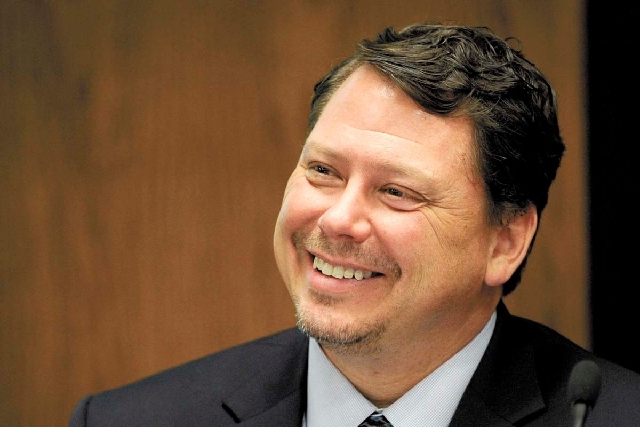Superintendent selection already being questioned
Questions about the validity of the Clark County School Board’s late-night, whirlwind decision to permanently hire Interim Superintendent Pat Skorkowsky on Tuesday are already swirling among those taken aback by the action.
Doubts about the legality of the appointment also exist, according to an open meeting law attorney who cites precedents set by the Nevada Supreme Court and Nevada attorney general.
“This is a clear violation of the open meeting law,” Las Vegas lawyer Jacob Hafter said of the hire. The agenda for Tuesday’s meeting contained a general item about the superintendent search, but did not specify that Skorkowsky would be interviewed or that a vote to hire him permanently would be held.
The Tuesday agenda item, “Superintendent Search,” has been on all nine School Board meetings since March 6, the day after former Superintendent Dwight Jones announced his resignation. That’s why Nevada Policy Research Institute education researcher Karen Gray didn’t attend.
“Nothing on there said we’re actually looking at hiring tonight. I would’ve gone,” she said, referring to the agenda.
The boiler-plate item stated the board may take “action regarding all aspects of the search and selection of a new superintendent.” In the two-and-a-half months leading up to Tuesday, the School Board just discussed search parameters, or skipped the item altogether.
Board President Carolyn Edwards on Tuesday unsuccessfully pleaded for delaying the vote on Skorkowsky to allow time to inform the public and prepare for an interview. The board’s legal counsel, Mary Ann Peterson, did not advise against taking action, and board members such as Erin Cranor argued that delaying the appointment would be “not wise or prudent.”
Was the School Board’s agenda item too vague?
Determining that would be up to the attorney general’s office, which investigates such incidents and could void questionable decisions, Chief Deputy Attorney General Keith Marcher said Wednesday.
Such a consequence would force the board to reconsider Skorkowsky’s appointment and take a new vote.
But the language of the state law is broad and only requires a public agenda to include “a clear and complete statement of the topics scheduled to be considered during the meeting.”
Marcher said he can’t comment on the legality of the School Board’s actions. However, recent rulings recognize that “a higher degree of specificity (for agenda items) is needed when the subject to be debated is of special or significant interest to the public,” according to a 2000 attorney general’s opinion issued against the Nevada Board of Regents.
That won’t bode well for the School Board’s defense if an investigation is launched, Hafter said, because the decision was such a crucial one. The new Clark County School District superintendent will oversee the nation’s fifth-largest school system and a $2 billion annual budget.
The Board of Regents case in 2003 made its way to the Nevada Supreme Court, which found that an action related to a broad agenda item is a way of “circumventing the notice requirement.”
The Legislature enacted the open meeting law in 1960 because “incomplete and poorly written agendas deprive citizens of their right to take part in government,” according to the Supreme Court ruling against the Board of Regents.
Usually, when government bodies interview and appoint leaders, agenda items become more detailed to reflect that, Marcher said. Appointments don’t come “out of the blue” or exclude the public from such pivotal decisions, which is what the law is intended to prevent, he said.
Not even Skorkowsky, a 25-year district veteran, knew he would be interviewed and hired Tuesday. His contract will be negotiated in the coming weeks. His predecessor, Jones, had a four-year contract and earned an annual salary of $270,000. His total compensation package was $358,000.
The state’s open meeting law manual says, “Agenda items must be described with clear and complete detail so that the public will receive notice in fact of what is to be discussed.”
That manual tells elected officials to avoid “general or vague language,” and “broad categories,” which seem to apply to the School Board’s agenda item on the superintendent search, Hafter said.
“The manual says you can’t say we’re going to continue to discuss the search (as Edwards said Monday at the end of the first half of the meeting) and then hire someone at that meeting,” Hafter said.
But the debate is moot unless someone files a complaint with the attorney general’s office, which won’t launch an investigation without being prompted, Marcher said.
Although he disapproves of the below-the-radar hire made without considering other applicants, Stephen Augspurger, executive director of the district’s administrators union, won’t file a complaint.
“It ought to be a transparent process. Obviously, that didn’t happen this time,” he said.
Augspurger advocates supporting the chosen superintendent and letting go of the conflicting special interests that clouded the superintendent search.
However, anyone can file a complaint, Marcher said.
“This would be an interesting case, if we get it,” he said. “We’d certainly look at it closely.”
Contact reporter Trevon Milliard at
tmilliard@reviewjournal.com or 702-383-0279.

















